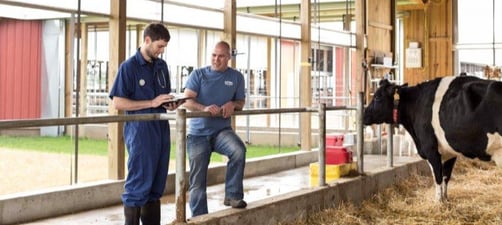It comes as no surprise that, in our ever-changing dairy industry, the role of the veterinarian has evolved a lot in recent times. During the early days of the profession, the role of the farm vet – especially in the dairy sector – was focused on treating individual animals. For years this was the general perception, but right now we are developing a new standard, a new ‘normal’.
Step by step the role of the veterinary surgeon is evolving, with the focus increasingly on prevention rather than cure and on herd management instead of treating individuals. In doing so, the farm vet has become an ever more essential member of the dairy farm team and one whose role has developed into that of a consultant as much as a veterinary medicine practitioner.
"There always will be a role for the farm vet, but I think our role will evolve into that of a consultant rather than actual practitioners. In time, the importance of treating individual cows will diminish, with the focus shifting more towards whole herd health, rather than individual animal medicine."*
Like any other business, the key to success is maintaining a well-organised team, who all work together for one common goal: in our case, healthy, highly productive animals and a profitable farm.
As mentioned above, the need to examine and treat individual animals has decreased over time as a result of improved animal husbandry, increasing herd size and better business planning. Nonetheless, the veterinarian – along with your farm employees and nutritionist – should be an important member of your team and someone you communicate with on a frequent base, and not just when a problem arises.
In order to ensure modern dairy farms remain efficient and productive it is essential to put in place effective and proven working protocols which safeguard the business’s primary goal: the maintenance of healthy, productive animals. The contribution of your veterinarian can be decisive when establishing successful guidelines for calving, newborn calf care, disease symptom detection, animal welfare and animal-handling and to fine-tune these protocols as and when required. Your veterinarian could also help with training your wider team to ensure these protocols are implemented correctly and consistently.
Your farm vet could also be the person you go to for all animal and regulatory related questions: they are required to keep themselves abreast of all new welfare guidelines, national regulations, antibiotic restrictions, new developments, new animal healthcare products, etc., and as such are ideally positioned to help you making sure your business is compliant with the very latest statutory restrictions and guidelines.

Once these protocols are in place, it is important to collect herd-specific data in order to fine-tune your working practices and to be able to react quickly and decisively when a problem occurs. The data you gather should cover all aspects of the annual production cycle, including calving, weaning, reproduction, milk production, health events, etc. By having this data available, you’ll be able to work with your staff, nutritionist and vet to understand which protocols are benefitting your business and which factors are hindering your success: your veterinarian can help you with picking the right parameters for your business to monitor and to interrogate these key performance indicators on a regular basis. In doing so, you’ll identify the areas where improvement is needed and the magnitude of any problems. Armed with this information, you and your team will subsequently be able to implement an effective strategy to overcome any recurring problems and to maximise the farm’s return on investment. It is essential to continually identify, document and benchmark this work in order to ensure the business keeps moving forwards.
"I think a lot of our job is going to be looking at data from various different inputs on the farm… this will possibly mean we’ll spend less time on the farm working with animals and more time in front of a computer analyzing data; the time we actually spend next to a cow is going to be limited compared to what we do now."*
At Phibro we are fully supportive of this future-orientated approach: our team of Dairy Technical Specialist includes veterinarians and nutritionists, all of whom are tasked with contributing to your dairy farm’s success. We are here to provide honest, practical and professional advice on how to improve the health and productivity of your dairy herd and are always happy to work with your farm veterinarian and nutritionist to optimise your herd’s performance.
To find out more about how we can help, or to contact your local Dairy Technical Specialist, please visit this page.
* Woodward, H; K. Cobb and J. Remnant. 2019. The future of cattle veterinary practice: insights from a qualitative study. Veterinary Record doi: 10.1136/vr.105321
Subscribe to our blog updates and receive new blog articles in your mailbox.
